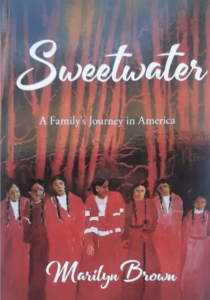 Title: Sweetwater
Title: Sweetwater
Author: Marilyn Brown
Publisher: Self
Genre: Historical Fiction
Year Published: 2024
Reviewed by Lynne Larson
A beautiful metaphor of “Sweetwater” winds through author Marilyn Brown’s latest tribute to the remarkable pioneer, James S. Brown.
Latter-day Saint Apostle Hugh B. Brown was quoted as saying, “It would be difficult to state just what phase of James S. Brown’s career appeared strongest. As a member of the Mormon Battalion he was all that a soldier could be, and more than the average man would have been. As a scout and Native fighter, he was brave, humane, and prudent. As a missionary to the South Sea Islands, he stood true to his post . . . As a son, husband, and father, his course was the same manly undeviating path of righteousness.”
Springville author Marilyn Brown has recently completed a stirring historical novel based on the life of James S. Brown, her husband Bill’s great great grandfather.
While most family histories begin with facts and dates, Brown begins her preface with Latter-day Saint Prophet Gordon B. Hinckley’s advice to the writers of our pioneers. “I feel their story is deserving of a better telling than we are giving it . . .The job before us is to make the drama as vital as the real thing was.”
Marilyn Brown has followed his advice. This story begins with a boat accident on the polluted Thames in which the 1757 grandfather dies before sending his first son Will and his family to America in search of freshwater land. Marilyn is skilled at showing the endless labors of Will’s family as they build, plant, milk, harvest, chop, mend and birth. On the periphery of their lives is the American Revolution, the French-Indian wars and Native threats. Guns are both a help and a hazard, but the Browns carry on.
Finally, Will’s grandson James S. Brown joins the Mormon Battalion and finds gold at Sutter’s Mill on the way home. He begins to learn the Native languages, which make him so valuable to Brigham Young. He also learns Tahitian as a missionary to Tahiti, where he is accosted by cannibals.
Spending twelve years away from his parents and friends, he finally settles in Ogden, marries four wives, and produces thirty children. His family didn’t recognize him when they saw him. But the reunion was wonderful.
The Brown family indeed tasted the Sweetwater for which their ancestors searched when they left the polluted Thames behind. We as readers can taste it also, as we read of the sacrifices and the commitments of James S. Brown, who gave so much to the growth of the country.
